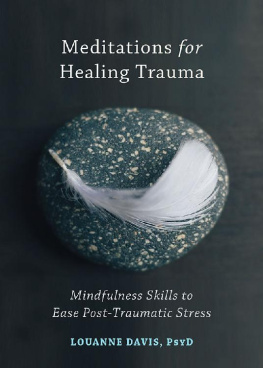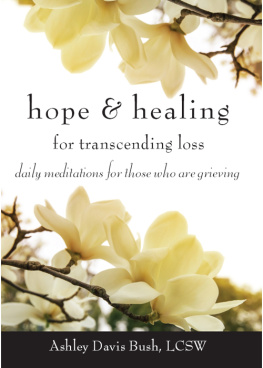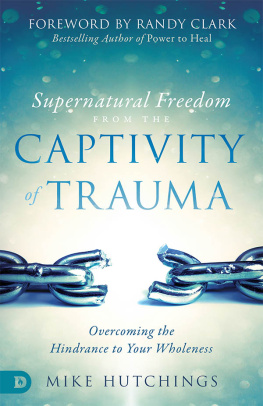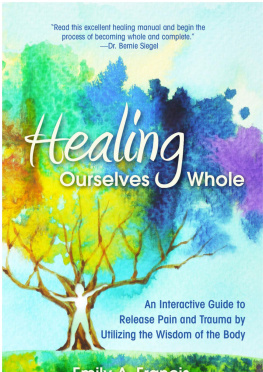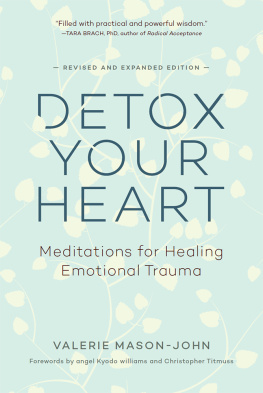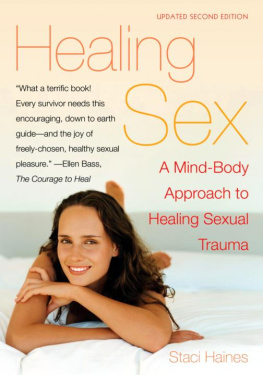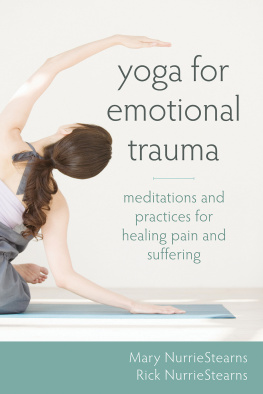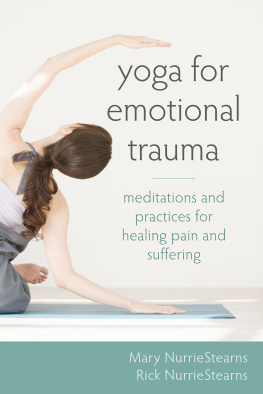Louanne Davis - Meditations for Healing Trauma
Here you can read online Louanne Davis - Meditations for Healing Trauma full text of the book (entire story) in english for free. Download pdf and epub, get meaning, cover and reviews about this ebook. year: 2017, publisher: New Harbinger Publications, genre: Religion. Description of the work, (preface) as well as reviews are available. Best literature library LitArk.com created for fans of good reading and offers a wide selection of genres:
Romance novel
Science fiction
Adventure
Detective
Science
History
Home and family
Prose
Art
Politics
Computer
Non-fiction
Religion
Business
Children
Humor
Choose a favorite category and find really read worthwhile books. Enjoy immersion in the world of imagination, feel the emotions of the characters or learn something new for yourself, make an fascinating discovery.
- Book:Meditations for Healing Trauma
- Author:
- Publisher:New Harbinger Publications
- Genre:
- Year:2017
- Rating:4 / 5
- Favourites:Add to favourites
- Your mark:
- 80
- 1
- 2
- 3
- 4
- 5
Meditations for Healing Trauma: summary, description and annotation
We offer to read an annotation, description, summary or preface (depends on what the author of the book "Meditations for Healing Trauma" wrote himself). If you haven't found the necessary information about the book — write in the comments, we will try to find it.
Meditations for Healing Trauma — read online for free the complete book (whole text) full work
Below is the text of the book, divided by pages. System saving the place of the last page read, allows you to conveniently read the book "Meditations for Healing Trauma" online for free, without having to search again every time where you left off. Put a bookmark, and you can go to the page where you finished reading at any time.
Font size:
Interval:
Bookmark:
We are not to blame for the effects of trauma, but we can certainly do something about it. In clear language that speaks to the heart of trauma, Louanne Davis offers a series of elegant meditations that wean the mind from fear, and back into connection with oneself and others. Readers also learn how to tailor the practices to their own needs, and seamlessly integrate them into daily life. This book is a wise and welcome guide to healing and recovery. Highly recommended!
Christopher Germer, PhD, faculty member at Harvard Medical School, author of TheMindfulPathtoSelf-Compassion, and coeditor of MindfulnessandPsychotherapy
Those who have survived trauma know all too well how feelings of anxiety and confusion can seem to linger on and on. In this enlightening book, trauma expert Louanne Davis clearly explains the nature of trauma reactions, and provides natural and scientifically researched methods to help along the road to recovery. By reconnecting with your body, heart, and mind, you can begin the journey to getting your life back.
Richard Sears, PsyD, author of Mindfulness
As both a researcher and practitioner, I have yet to come across a book on mindfulness that is more accessibly written for individuals struggling with post-traumatic symptoms. Mindfulness can be hard to describe, let alone implement, especially for those with the types of symptoms that trauma survivors suffer. I highly recommend this book for anyone striving to thrive after trauma.
CandiceM. Monson, PhD, professor of psychology at Ryerson University in Toronto, Ontario, CA, coauthor of CognitiveProcessingTherapyforPTSD, and original developer of cognitive-behavioral conjoint therapy (CBCT) for post-traumatic stress disorder (PTSD)

Publishers Note
This publication is designed to provide accurate and authoritative information in regard to the subject matter covered. It is sold with the understanding that the publisher is not engaged in rendering psychological, financial, legal, or other professional services. If expert assistance or counseling is needed, the services of a competent professional should be sought.
Distributed in Canada by Raincoast Books
Copyright 2016 by Louanne Davis
New Harbinger Publications, Inc.
5674 Shattuck Avenue
Oakland, CA 94609
www.newharbinger.com
Cover design by Amy Shoup
Acquired by Wendy Millstine
Edited by Jean Blomquist
All Rights Reserved
Library of Congress Cataloging-in-Publication Data on file
For my husband, Jim, and my sons, John and Chris Whitman, whose love and encouragement support all of my endeavors. For my many teachers, mentors, and colleagues, especially those at the Center for Mindfulness at the University of Massachusetts Medical School and the Richard L. Roudebush VA Medical Center in Indianapolis, Indiana. You have generously shared your wisdom and friendship over the years. For all who suffer with post-traumatic stress, especially those who have touched my life and inspired my work. Many of you contributed to this project in various ways. Without you, my clinical work, research, and writing about mindfulness and PTSD would not be possible.
When you live through something really horrible, it shocks you to the core. This type of event is called a trauma. Traumas take many forms: The man or woman who is raped. Victims of a flood and the first responders who rescue them. Soldiers who see friends and innocent civilians injured and killed in a war zone. The driver who is almost killed when his car goes off the road. And there are those who endure repeated trauma, such as the child who is beaten, or verbally or sexually abused. Trauma then becomes part of daily life. All these people have one thing in common: its likely that the trauma left them feeling terrified, enraged, ashamed, and helpless.
A trauma overwhelms you. You may feel that its more than you can handle. You may not expect to survive. The extreme stress caused by trauma disrupts the connection between your body, heart, and mind. That connection helps you function at your best in your day-to-day life. Your body, heart, and mind are designed to work together. When they work together, they help you recover from traumalike a sailboat that rights itself after a wave tips it over. Of course, how long it takes to recover depends on how bad the storm is, what shape the boat is in, and what resources are on hand for repairs. Brain scans of traumatized people show signs that trauma disturbs this self-righting system (Hayes, Hayes, and Mikedis 2012). You need this self-righting system to heal and recover.
After a trauma, everyone experiences post-traumatic stress to some extent because it is a natural reaction to trauma. The changes in the body, heart, and mind that were needed to survive are no longer needed once the threat is over. A feeling of being safe returns and the natural recovery process can begin. For most people, the signs of post-traumatic stress lessen considerably during the first month after the trauma. Over time, the body, heart, and mind are able to function the way they did before the trauma. This allows people to make sense of painful trauma-related thoughts and emotions. They feel comfortable again in their own skin. They can gradually reconnect fully with their body, heart, and mind. Their memory of what happened and their feelings about it will never totally go away, but it will no longer consume them. And they will no longer need to disconnect from their thoughts, memories, emotions, and even their own bodies to avoid becoming overwhelmed. Unfortunately, some people get stuck on the path to recovery for months, years, or even decades (Levine 2008; Monson and Fredman 2012).
Because you picked up this book, maybe you feel that you are stuck on the path to recovery from trauma. You may feel as if you are stuck in a time warp where you will be haunted forever by the trauma. You may even believe that you deserve the stressful aftereffects as punishment for something you did or did not do during the trauma. You may feel hopeless. You may believe that you will never be happy. You may feel like you dont even know who you are anymore.
All of your experiences, traumatic or not, are part of who you are and who you become. Trauma can never be erased. However, trauma and loss can be woven into your life story. Once the trauma becomes only part of your life story, it no longer takes over your identity and keeps you from living a meaningful life. The good news is that it is possible to get unstuck. You can move beyond just surviving after trauma to living life fully. When you are able to tend to the emotional injury from trauma, your wounds can heal. With healing, your emotional pain and suffering from the trauma will become a much smaller part of your daily life.
Many who suffer from trauma believe that tending to their emotional wounds is the wrong thing to do. They may believe that talking about the effects of trauma is like picking at the scab of a flesh wound; it should be left alone in order to heal properly. But once the effects of trauma take root, its almost as if the emotional wounds become infected. In order to heal, emotional wounds need care. Tending to the emotional wounds of trauma can even transform you and your life in unexpected, positive ways.
This book is for people like youpeople who have survived a traumatic event. It doesnt matter where you are on the path of recovery. The mindfulness skills that you will learn in this book will help you reconnect with your body, heart, and mind.
Next pageFont size:
Interval:
Bookmark:
Similar books «Meditations for Healing Trauma»
Look at similar books to Meditations for Healing Trauma. We have selected literature similar in name and meaning in the hope of providing readers with more options to find new, interesting, not yet read works.
Discussion, reviews of the book Meditations for Healing Trauma and just readers' own opinions. Leave your comments, write what you think about the work, its meaning or the main characters. Specify what exactly you liked and what you didn't like, and why you think so.

